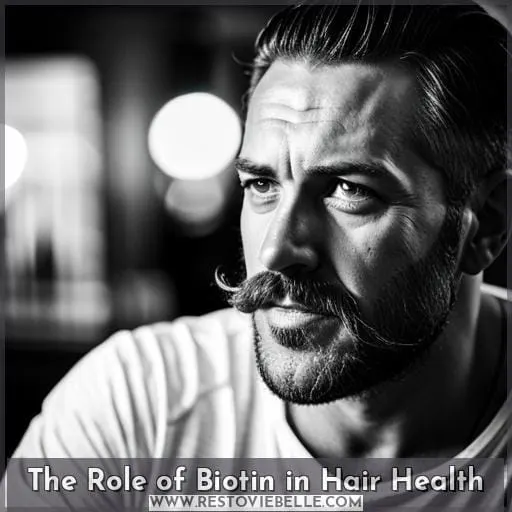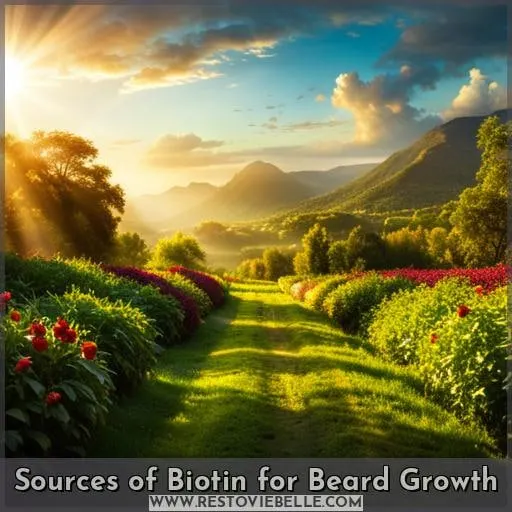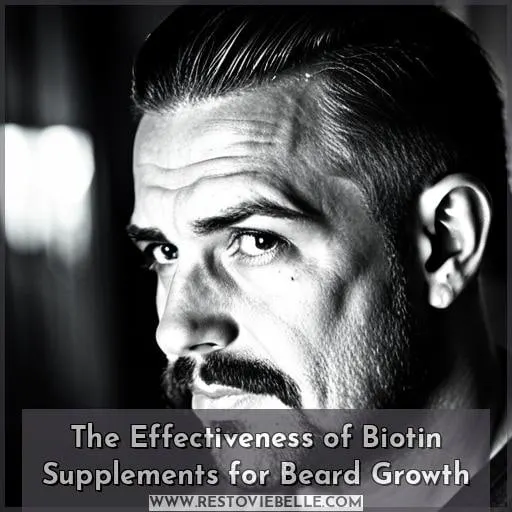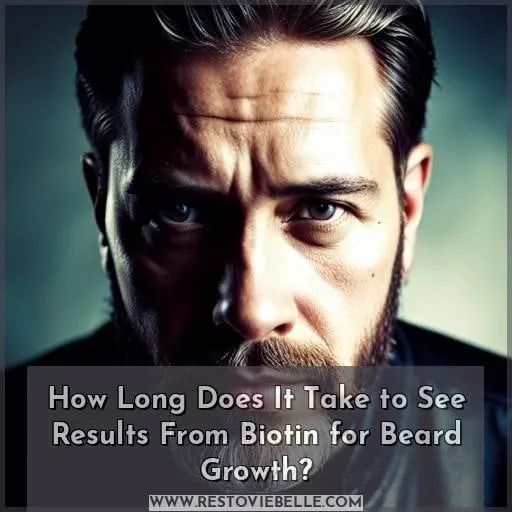This site is supported by our readers. We may earn a commission, at no cost to you, if you purchase through links.
 Are you looking to join the growing beard culture? Having a full, distinguished beard isn’t something all men can achieve effortlessly. Fortunately, there are ways to improve your facial hair’s thickness over time. One possible solution is taking biotin (vitamin B7) supplements.
Are you looking to join the growing beard culture? Having a full, distinguished beard isn’t something all men can achieve effortlessly. Fortunately, there are ways to improve your facial hair’s thickness over time. One possible solution is taking biotin (vitamin B7) supplements.
They’re known for promoting healthy skin and nails as well as aiding with hair growth, including beards! But what does science say about their effectiveness in improving your ‘mane’? In this article, we’ll explore how biotin affects our beards and answer the question ‘does biotin help beard grow?’ We’ll also explain where it comes from, its potential side-effects, and why incorporating other techniques may provide better results than relying solely on supplementation.
Table Of Contents
- Key Takeaways
- How Does Biotin Affect Beard Growth?
- The Role of Biotin in Hair Health
- Sources of Biotin for Beard Growth
- Biotin Deficiency and Its Impact on Beard Growth
- The Effectiveness of Biotin Supplements for Beard Growth
- Considerations and Caution When Taking Biotin for Beard Growth
- Holistic Approach to Beard Growth
- How Long Does It Take to See Results From Biotin for Beard Growth?
- Frequently Asked Questions (FAQs)
- Is it safe to take biotin for beard growth?
- Can biotin be taken in conjunction with other supplements for beard growth?
- Does the amount of biotin taken have any effect on beard growth?
- Are there any potential side effects associated with taking biotin for beard growth?
- Are there any foods that naturally contain biotin that can help with beard growth?
- Conclusion
Key Takeaways
- Biotin supplements can improve beard thickness and growth.
- Biotin is important for healthy skin, nails, hair, and beards.
- Incorporating biotin-rich foods in the diet can enhance beard growth.
- A balanced approach involving nutrition, grooming, stress reduction, and exercise is crucial for optimal results.
How Does Biotin Affect Beard Growth?
You want to look your best and keep up with the latest trends, so understanding how biotin contributes to healthy hair growth is essential for achieving a desirable beard. Biotin, or vitamin B7, plays an important role in maintaining cellular function and hormone balance that affects hair follicles.
It’s also involved in keratin production, which helps strengthen scalp health as well as promote faster beard growth.
The quality of biotin supplementation matters since this can influence genetic factors like facial structure too.
Your dietary habits also play a major part when it comes to getting more out of taking biotin supplements. Eating foods rich in the nutrient will help ensure better absorption into the body systems and maximize its effects on enhancing your beard growth rate significantly over time without any additional side effects from external sources such as chemicals or other ingredients found commonly within products meant for styling beards today.
The Role of Biotin in Hair Health
The importance of biotin in hair health and facial hair growth is undeniable. Also known as vitamin B7 or vitamin H, biotin plays a vital role in maintaining healthy skin, nails, and, most importantly for our purposes, beard growth.
While the small intestine does produce some biotin naturally within the body, it’s mainly obtained from dietary sources like eggs, nuts and seeds, bananas, or red meat. The reason for this is that its main function is to contribute to keratin production – an essential protein crucial for keeping your beard strong and healthy.
Another key factor when discussing how we can get enough of this important nutrient into our bodies is through supplementation. Particularly those with deficiencies may see a positive impact on their facial hair by taking reliable supplements containing high levels of biotin.
However, caution should be taken here as there have been reports that too much intake could lead to increased insulin release, which might affect blood sugar levels – so consulting with healthcare specialists prior to supplementing would be advisable if you have pre-existing medical conditions such as diabetes.
Moreover, lifestyle factors need to be considered as well. Regular exercise, reducing stress, along with proper grooming techniques will all help maintain good overall health, thus promoting better results when attempting to achieve successful beard enhancement goals.
Sources of Biotin for Beard Growth
Discovering the right sources of biotin can be key to achieving healthy hair and skin. Biotin, a type of vitamin B, is essential for producing keratin—the protein that forms our hair strands. To get enough biotin naturally through diet alone, one must consume foods such as eggs, nuts, and seeds, red meat, or bananas regularly.
Additionally, dietary changes like incorporating more fresh fruits and vegetables into meals can help provide your body with adequate amounts of vital nutrients, including vitamins A and C, which are also beneficial for beard health.
Supplements may be used to increase levels if dietary intake isn’t sufficient, but it’s important to understand proper grooming tips when using them. The dosage should not exceed 10mg/day unless advised by a healthcare provider. Due diligence must be exercised in supplement selection as many on the market contain fillers or added ingredients that could cause adverse reactions in some individuals based on their individual risk factors.
Natural sources like brewer’s yeast offer an alternative option, providing high concentrations of both biotin and other B-vitamins, which have been linked to improved overall well-being.
Overall, regular exercise, healthy eating habits, and quality supplements are all integral elements necessary for facial follicle development while minimizing potential risks associated with inadequate nutrition.
Biotin Deficiency and Its Impact on Beard Growth
By understanding the role of biotin in your body, you can determine if a deficiency is impacting your beard growth. Biotin, also known as Vitamin B7 or Vitamin H, plays an important part in maintaining healthy hair and nails.
It contributes to keratin production, which is essential for strong facial hair structure.
A lack of this vitamin may lead to weaker and more brittle strands with less noticeable results from care regimen efforts such as oiling and combing. Prenatal vitamins are a great source of biotin; however, dietary needs vary, so it’s important to assess specific requirements before taking supplements without medical advice.
A deficiency can manifest itself through changes in texture. Dullness or thinning out occurs when there isn’t enough biotin available for proper synthesis of keratin proteins that give each strand strength and bounce back after manipulation like brushing or blow drying.
Proper diagnosis requires testing by a healthcare provider, but signs could include dry skin around the chin area where facial hairs grow.
If too little biotin exists due to dietary habits, deficiencies should be addressed first rather than relying on supplements alone since other vitamins play significant roles in overall health, such as zinc, which helps maintain cell membrane integrity necessary for proper absorption.
To restore balance, lifestyle factors must be taken into account, including stress reduction techniques, exercise routines, along with adequate sleep schedules. These will help create an environment conducive to optimal beard growth while ensuring maximum benefit from any supplementation plan put forth by a doctor.
Not only does this approach promote better physical outcomes, but it also provides mental well-being, allowing fuller enjoyment of life experiences.
The Effectiveness of Biotin Supplements for Beard Growth
Supplementing with biotin may give your beard a boost, but it’s wise to take an all-encompassing approach for the best results. Taking biotin supplements alone is unlikely to result in significant facial hair growth.
Instead, lifestyle factors such as proper grooming and exercise must be combined with a balanced diet high in vitamins and minerals for optimal effects.
Biotin supports healthy beard growth by contributing to keratin production while helping reduce blood sugar levels when taken correctly. However, individuals at risk of diabetes should consult their healthcare provider before taking any dietary supplement or vitamin due to potential risks associated with raised insulin levels and blood sugar spikes.
In addition, stress reduction plays a key role in maintaining optimal hair quality – both length and thickness. So incorporating relaxation techniques into daily habits can provide further benefits beyond just those related directly to facial hair health.
Quality matters when selecting biotin supplements. Reputable brands are typically more effective than generic products that may contain fillers instead of active ingredients needed for successful long-term use on its own or alongside other essential nutrients like zinc.
Ultimately, combining all these elements together will help lead you down the path towards achieving your desired level of success regarding increased facial hair development resulting from using natural approaches such as biotin supplementation alongside basic lifestyle changes, including proper hygiene practices and a regular physical activity regimen tailored specifically around meeting personal goals related to improving overall happiness and wellbeing through improved self-confidence achieved via growing out luscious-looking, lush locks worthy of being proud!
Considerations and Caution When Taking Biotin for Beard Growth
Before taking biotin for beard growth, it’s important to understand potential risks and consider consulting a healthcare provider. Supplementation with this nutrient can affect blood sugar levels in individuals with diabetes, as well as interfere with certain lab tests and medications.
Although lifestyle factors like adequate sleep and stress management play an integral role in overall hair health, incorporating nutrient supplementation into your routine is strongly recommended by many experts.
However, caution should be taken due to the potential side effects of biotin supplements if used improperly or without professional guidance.
If you suspect that you have a deficiency or are considering taking a supplement regardless, seek advice from your doctor before beginning any new regimen. They will evaluate your current diet plan and determine whether additional nutrients are necessary for optimal results while minimizing the risk of harm.
A comprehensive approach is key when looking to improve beard growth. Proper hygiene practices combined with healthy eating habits provide the most effective solution for successful enhancement over time without compromising safety.
Holistic Approach to Beard Growth
For optimum beard growth, a well-rounded approach including balanced nutrition, proper grooming techniques, stress reduction strategies, and exercise should be implemented – holistically addressing your individual needs.
Improved nutrition can help the hair follicles create more keratin proteins to strengthen strands for lush facial hair. Incorporating lifestyle changes such as reducing caffeine intake or taking up yoga may also reduce anxiety levels that could lead to thinning of the beard.
Exercise is key in stimulating blood flow and aiding circulation, which helps nourish new hairs while restricting breakage of existing ones. When considering biotin dosage for optimal results, it’s important to consult with a healthcare provider first before starting any supplement regimen – especially if you have health conditions or take medications regularly due to its effects on insulin release and blood sugar levels (especially relevant for individuals living with diabetes).
Hair products containing essential fatty acids like coconut oil are great natural alternatives when looking after the skin beneath the chin too; just make sure not to opt into aggressive styling habits like tight braids that pull at delicate scalp skin!
For those interested in furthering their workout plan, consider adding weight training exercises as this has been linked to significantly improved testosterone production – another factor associated with thickening facial fuzz!
Ultimately, by implementing these all-encompassing grooming techniques paired with appropriate vitamins from B vitamin complex supplements, you will achieve an impressive fullness fit for Viking kings!
How Long Does It Take to See Results From Biotin for Beard Growth?
Taking into account your lifestyle and diet, you may be wondering how long it takes to see results from biotin for beard growth. Research evidence suggests that biotin supplementation can help improve facial hair health and promote regrowth when a deficiency is present.
However, safety should always be taken into consideration before introducing any new supplement regimen; consulting a healthcare provider is advised for optimal effects.
To achieve the best possible outcomes with biotin supplementation:
- Ensure adequate dietary balance by including sources of vitamin B7 such as eggs, nuts, seeds, or red meat in your meals.
- Prioritize healthy lifestyle changes such as regular exercise and stress reduction.
- Consider other medical advice if necessary to ensure safe use of supplements.
- Investigate reputable brands in order to make an informed decision on quality products.
- Remain patient during the process while trusting in ongoing research evidence surrounding the efficacy of keratin infrastructure establishment through vitamin B7 effects found within Biotin Supplements.
As each individual will respond differently based on their own unique biology, gradual improvements over time are more likely than overnight success stories. Therefore, it’s important not only to understand why certain steps must be taken but also to remain mindful that subtle shifts take place, which culminate into lasting transformations taking form over longer periods.
Frequently Asked Questions (FAQs)
Is it safe to take biotin for beard growth?
Taking biotin for beard growth is generally safe, but consulting a healthcare provider beforehand is strongly advised. Biotin may help improve hair health and strength when taken in appropriate doses by those deficient in it.
However, its effects on insulin release and blood sugar levels should be considered before taking any supplement.
Can biotin be taken in conjunction with other supplements for beard growth?
You can take biotin with other supplements for beard growth. Although the scientific evidence is limited, studies have suggested that biotin may support healthy hair when taken alongside a holistic approach involving diet, exercise, and stress management – but always consult your doctor first!
Does the amount of biotin taken have any effect on beard growth?
Taking biotin can help increase hair growth, but the amount taken may not have a significant effect. Studies suggest that taking 5-10 mg per day is sufficient for most people to see positive results, regardless of age or gender.
Ultimately, it’s best to consult your doctor before deciding on an appropriate dosage as everyone will respond differently to supplements and lifestyle changes.
Are there any potential side effects associated with taking biotin for beard growth?
Taking biotin for beard growth may have potential side effects, such as skin rashes or digestive issues. Therefore, it’s wise to consult with a healthcare professional before starting any supplement regimen to ensure safety and optimal results.
Are there any foods that naturally contain biotin that can help with beard growth?
Yes! Foods such as eggs, nuts, seeds, bananas, and red meat contain biotin, which contributes to healthy hair growth. Supplementation may help too – but be sure to consult a healthcare provider first.
Conclusion
It’s no secret that a luscious beard can be a symbol of health and virility. But how does biotin, a commonly recommended supplement, affect beard growth? The facts point to biotin playing an important role in hair health and strength, with deficiencies potentially leading to brittle hair and nails.
While biotin supplements may help promote beard growth, the quality of the supplement is key. Additionally, biotin should be just one element of a comprehensive approach to beard growth, which should also include exercise, stress reduction, and a balanced diet.
Before taking biotin, bear in mind that it can affect insulin release and blood sugar levels, so consult a healthcare provider if you have existing conditions or take medications.
All in all, when taken in combination with a holistic approach, biotin may help you achieve a healthier, fuller beard.














